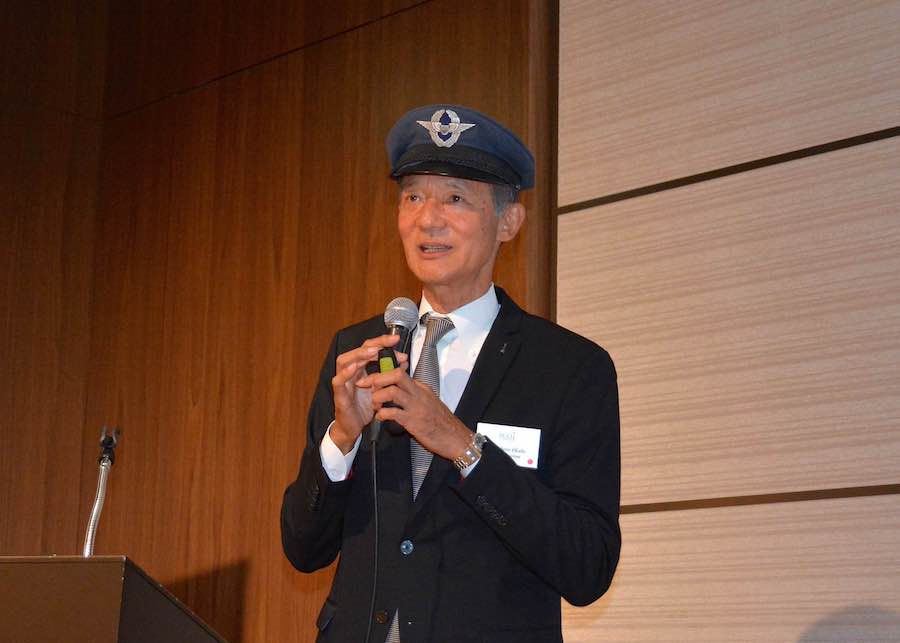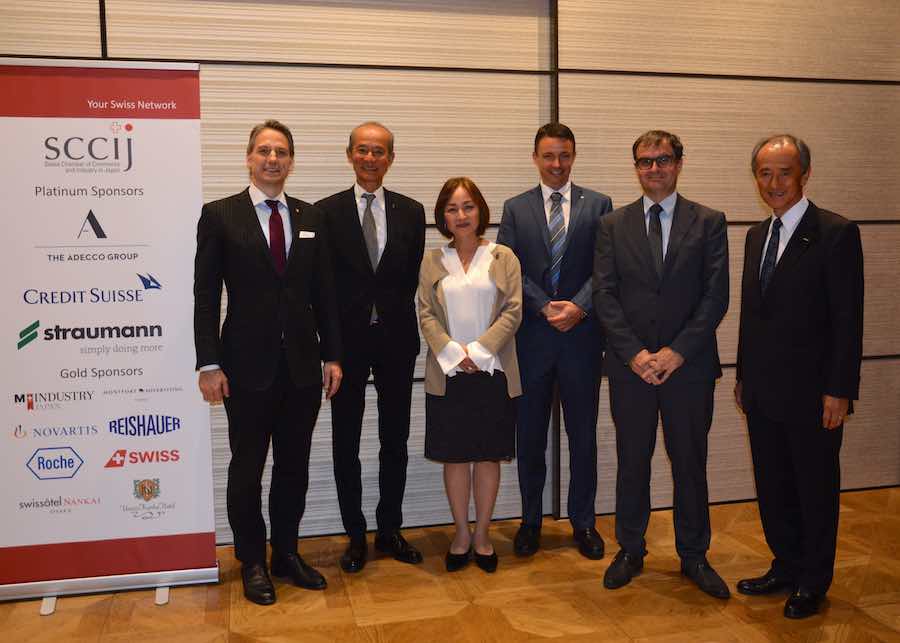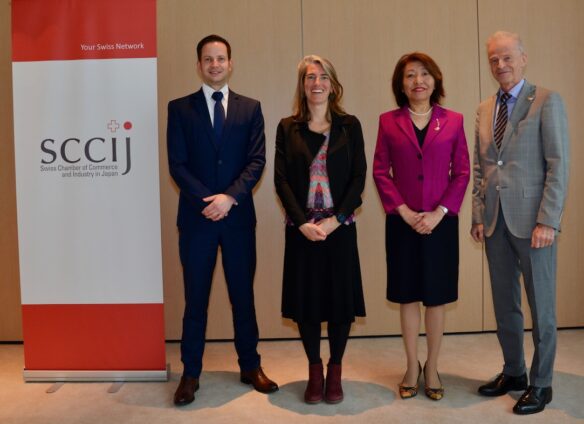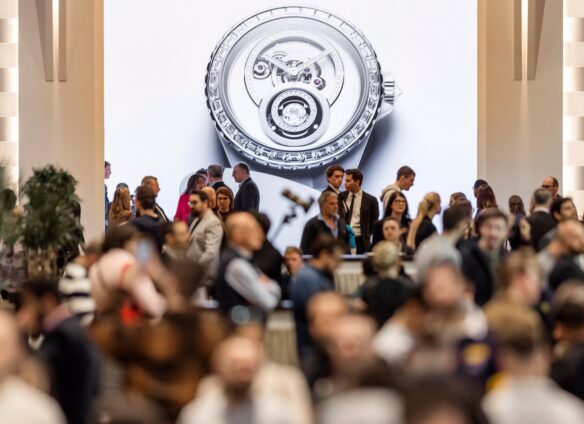Tokyo (SCCIJ) – October Luncheon speaker Noboru Okabe put more than 40 members and guests of the SCCIJ onto an entertaining and fascinating flight into the past, present and future of the airline industry by analyzing the history of Switzerland’s largest flight carrier formerly known as Swissair. The recently retired, long-time country manager of SWISS in Japan provided an overview of the changes in the airline industry and the mechanisms behind them. He ended his lecture with a plea to foster the “Swissness” of Swissair flights in order to distinguish the flight experience from other international airlines.
When Swissair was the world’s best airline
A short film about Swissair at the beginning of the luncheon put the audience back in time: It also showed Mr. Okabe 42 years ago on a gangway at Haneda airport with long, parted hair in the style of the 1970s. As the audience recognized his face, they cheered and clapped in amazement. At that time, Mr. Okabe was hired as check-in agent for the extra capacity of passengers when Swissair switched its Japan aircraft model from DC 8 to the larger DC 10.
“Swissair was considered the best airline of the world”, Mr. Okabe remembered the time when he started working for the Swiss airline. In economy class, passengers dined on chinaware and drank from real glasses. There was no flight entertainment. “You had to carry your own reading material and a pack of cigarettes”, he recounted. Alcohol drinks had to be paid for. When an inflight movie was shown some years later, you had to buy your own earphones to listen to the soundtrack of the movie.

SCCIJ October Luncheon speaker Mr. Noboru Okabe
Conservative and small airline
Mr. Okabe described Swissair as a very conservative airline which used to change its way of business more slowly and later than its rivals. “For example, Swissair was the last airline which switched from the Southern route to Japan to the new route via Anchorage and the North pole,” he recounted. “I was at the time at the sales department and all passengers wanted to fly the much shorter one-stop Anchorage route but the head office refused.” The reason was the stopovers on the Southern route which allowed Swissair to take new passengers and cargo on board.
A second example of this glacial management style was the introduction of business class which was started by American Airlines followed by major European carriers. “But Swissair had lots of excuses and reasons not to introduce business class”, Mr. Okabe said. For example, the management argued that its economy class service was so excellent that there was no need for a business class.
Fatal non-membership in European Union
The speaker went on to explain why Swissair went bankrupt in 2001 in connection with the insolvency of the Belgian airline Sabena, a subsidiary of Swissair. “We went bankrupt for two reasons”, Okabe argued. First, Swissair expanded too much into the tourism industry and by buying other European airlines. Second, the expansion was an inevitable result of the decision of Switzerland not to join the European Union.
“As a non-member of EU, Swissair was forced to fly always from Switzerland and back whereas any EU airline is allowed to freely start and land within any of the EU member states”, he explained this interconnection. “In order to overcome this handicap, Swissair had to acquire loss making airlines based in EU member states such as Sabena.” This development finally led to the bankruptcy of Swissair itself.

Members and advisors of SCCIJ Executive Committee with luncheon speaker Mr. Okabe
Surviving as member of a big group
Mr. Okabe identified the low ticket prices as the main cause of the airline industry’s decline during the last decades. “Today, a passenger has to work 20 times less for a flight ticket from Zurich to New York than 40 years ago”, he said. From 1970 to 2010, the cost of this flight went down from CHF 4,400 to CHF 880. During the same period, the price of a Volkswagen Golf rose from CHF 7,300 to CHF 24,500.
The two causes of the collapse of the ticket prices were the introduction of Low Cost Carriers (LCC) from 1996 onward and the advent of state-sponsored carriers in the Middle East with their huge transportation hubs. “How can regular airlines still make money, how can they survive in this environment?”, the speaker lamented.
The choice of Swissair for survival was to join the Lufthansa Group. “To be honest, when I heard that Swiss was taken over by Lufthansa, I did not feel comfortable, because I was proud of being with Swissair and of its Swissness”, Okabe admitted. “But my mindset changed because of the comfort and the power of a bigger group.” For example, a group would have a higher purchasing power for fuel and aircrafts. Also, customers could earn and spend miles at any group members.
The next logic step was the creation of Japan-European joint venture airline companies, he explained. “ANA can take care of Lufthansa flights from Europe and Lufthansa takes care of ANA flights to Europe.”. But the cost cutting should not go too far, Okabe demanded. “We should not forget the human factor when it comes to convincing a Japanese passenger to fly with SWISS although the fare is a bit more expensive,” he said. Thus, SWISS should foster its “Swiss flight experience”. “This is my suggestion and conclusion”, he said and earned a long applause.
Biography of the speaker
Mr. Noboru Okabe (68) obtained a Bachelor of Law degree from Aoyama Gakuin University in Tokyo in March 1972. He joined Swissair as a check-in agent at Haneda Airport and then took on various roles such as an agent at the reservation-ticket counter and customer services, as a sales representative, and marketing manager. From 2002 to 2016, he was the General Manager of Swissair for Japan and South Korea. Since his retirement, he is the Japan representative of Zurich Tourist Office.
Text and photos: Martin Fritz for SCCIJ





























